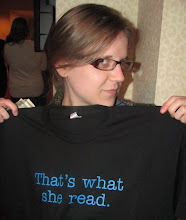--
Last night I was babysitting. And Josephine, who is seven, said to me, "You're old. You're a teenager."
"No, actually," I replied. "I'm twenty-two, which means that I'm not a teenager anymore."
"Wait, so you're an adult?" she asked incredulously.
I nodded.
"But you're a babysitter, not a mom," she argued. "You're still in college. And you live with your parents."
Every time I talk to kids, I'm reminded of how they're conditioned to accept life as some sort of clearly defined progression rather than the colorful mesh of experiences it actually is. To them, everyone
- gets a driver's license at 16,
- finishes high school by 18, moves out, then
- gets a college degree by the age 22, and shortly thereafter,
- gets married (to a member of the opposite sex), and
- has kids
I open with this story because the problem, to me, isn't necessarily exclusive to LGBT people. It's about the freedom to lead your life however you damn well please without being judged for it. And I don't think that can happen until this idea of a "fairy tale future" is seen as equal to all other futures that children may grow up to have.
I came across a blog post recently that's actually more than four years old now. But its author makes an interesting point: "Being gay used to mean a little bit of fabulous, a little bit of edginess, a little bit of fight and a little bit of fun. It was about standing out, not blending in. And somehow we lost some of that. Our fight now is not for protecting our right to be gay, but fighting for our right to act straight. And that truly saddens me."
I don't think it saddens me, exactly. I personally cannot picture myself ever getting married or having kids. But I will still fight for marriage equality and the rights of LGBT parents, because I want everyone to be able to do whatever suits them best.
And I don't think that this problem can be fixed until kids are taught to accept futures other than the ones outlined above. I want to live in a world where nobody's situation--be it a personal decision or a matter of unavoidable circumstance--is stigmatized.
Mitch Albom recently wrote a pretty obnoxious piece about parents in Toronto who are keeping the sex of their child a secret. What he said really pissed me off, namely "The Toronto couple believe they are giving their child a 'choice' -- even though that choice was made by nature and was evident in the first pee-pee" and "If the child... one day asks a doctor to mangle its private parts in an effort to be something else, it still will be unable to deny that it was born one way."
Holy whoa, transphobic!
Now, I do have my own mixed feelings about the couple's decision to let their child choose his or her own gender. But my concerns have nothing to do with biology. My problem with it, as you may have guessed by reading what I wrote above, is that life will be made harder for the child by the constraints imposed by society. And as we can see from what Albom wrote, that's already happening. And the kid hasn't even left the womb yet.
But because I believe that challenging those norms is what's ultimately going to change the climate for LGBT people, I support the Toronto couple's decision to keep the sex of their child a secret.
My own coming out experience has been, for the most part, very positive. My parents and most of my extended family members found out last fall that I'm a lesbian, and overall, it went pretty well. So I encourage LGBT people to come out; it's important. At the same time, however, I acknowledge how hard it is. It's still hard for me, even now. As anyone who has experienced it knows, coming out is a process that really never ends. A neighbor, for example, was telling me recently about how she got married at the age of nineteen. Then she realized that I'm older than nineteen, and asked me why I'm not married yet. "Never mind marriage," she said, "Girl, you're way behind. You don't even have a boyfriend."
I could have been honest and said, "Well, besides being happily single, it's not exactly legal for lesbians to marry in the state of Michigan."
But because of her tone, I didn't feel comfortable saying that. Nor was I up to defending LGBT rights to someone who may not have been open to such an argument. (Coming out to my parents, by the way, was one of the most exhausting things I've ever done. It went well, but even so, I felt drained for days afterward. That thought keeps me from speaking my mind a lot of of the time.)
I've witnessed a lot of bravery on the part of LGBT people. Living honestly in an inhospitable environment isn't easy. I've made a few brave moves myself. And that bravery has done me a world of good, which is why I think that it's time for the rest of society to be brave, too.






No comments:
Post a Comment